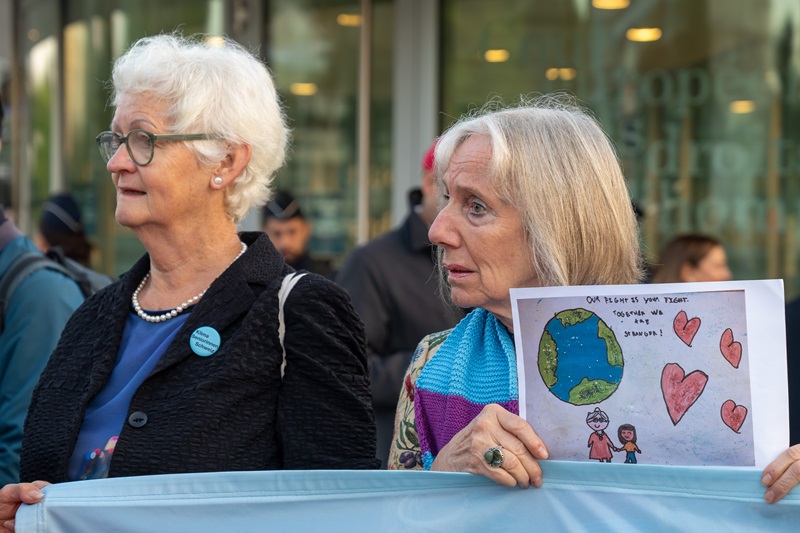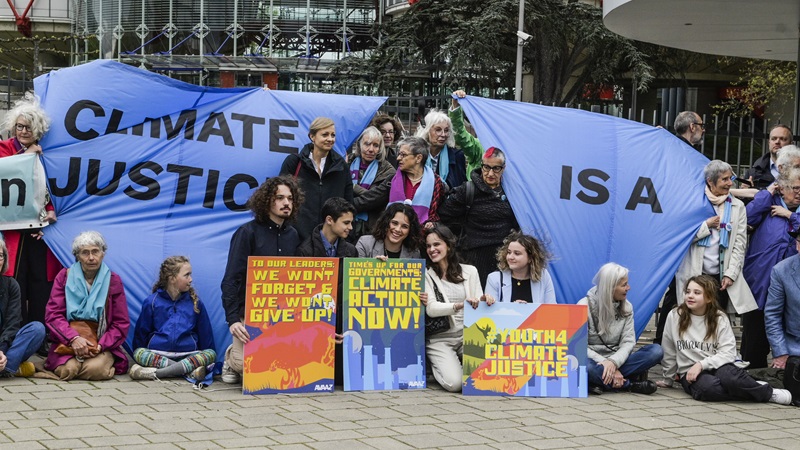European Court of Human Rights says Swiss government violated its citizens’ human rights by not doing enough to curb climate change
European judges have ruled that Switzerland has breached the human rights of its citizens by not doing enough to cut national greenhouse gas emissions, in a decision with wide implications for state action on climate change.
In a landmark judgment issued on Tuesday, the European Court of Human Rights upheld a complaint brought by more than 2,000 older Swiss women, saying their government had violated their rights to life and to respect for private and family life under the European Convention on Human Rights (ECHR).
It ruled that Article 8 of the ECHR, which refers to the right to a private and family life and home, “encompasses a right to effective protection by the State authorities from the serious adverse effects of climate change on lives, health, well-being and quality of life”.
Anne Mahrer, co-president of the Swiss KlimaSeniorinnen group that brought the case, said the ruling is a “landmark in the struggle for a liveable climate for everyone” as “the ECHR has now confirmed that climate protection is a human right”.
The decision is likely to encourage other campaign groups to bring cases against governments that are parties to the ECHR. This includes all European Union states, the United Kingdom, Norway, Turkey and some Central Asian states. A number of climate lawsuits had been adjourned at the court pending decisions in this and two other cases ruled on this morning.
Forest carbon accounting allows Guyana to stay net zero while pumping oil
Climate litigation is a growing trend around the world, and courts have previously linked climate with human rights violations. But this is the first time an international court has ruled on whether climate change infringes human rights.
Johan Rockström, director of the Potsdam Institute for Climate Impact Research, said heatwaves, droughts, floods and forest fires are already threatening human lives today, and will worsen as climate change intensifies, making it urgent for states to take action to reduce planet-warming emissions.
“Climate lawsuits can put pressure on governments to increase their climate policy efforts and thus advance diplomatic negotiations,” he said in a statement after the ruling.
Swiss seniors
The KlimaSeniorinnen Schweiz, an association of older women, argued that those it represents are particularly vulnerable to climate change and presented scientific evidence showing that older people – particularly women – are more likely to die during heatwaves. They wanted the Swiss government to do more to meet the tougher 1.5C warming goal it signed up to in the Paris Agreement.
The Swiss government had agreed that rising temperatures were harming people’s health – but denied that the KlimaSeniorinnen should be treated as victims under the law and said the link between its actions and their suffering was “too tenuous and remote”.
It maintained that some of the claimants – several of whom were over the age of 80 and some of whom had died since the case was first filed – were unlikely to be alive by the time the global temperature rise breaches the 1.5C threshold.

KlimaSeniorinnen Schweiz activists outside the courtroom in Strasbourg 9/4/24 (Photo: Global Legal Action Network)
On Tuesday, the 17-judge panel ruled that there were critical gaps in Switzerland’s attempt to put a domestic climate regulation framework in place.
It said Swiss authorities had failed to quantify how they would cut national greenhouse gas emissions, through a carbon budget or otherwise, and had failed to meet past emission reduction targets.
While recognising that states have wide discretion in setting their own laws and developing measures to cut national emissions, the court said Swiss authorities had not acted quickly or decisively enough.
The court did not say what Switzerland should do to solve the problem, leaving it to the Council of Europe’s Committee of Ministers to come up with a solution.
The judgment, which follows hearings last year, cannot be appealed.
Sébastien Duyck, human rights and climate campaign manager for the Center for International Environmental Law, said the decision has implications “way beyond Switzerland” because all members of the Council of Europe have the same human rights obligations.
Outside of Europe, he said it would also influence how other courts interpret the human rights obligations of states on climate action.
Two failures
The court in Strasbourg ruled on two other climate-related lawsuits on the same day.
One, brought by former French mayor and current member of the European Parliament Damien Carême against the government of France, was deemed inadmissible because he no longer lives in France and could not show that he was a victim.

19-year old Portugese applicant Sofia Oliveira in the court room in Strasbourg 9/4/24 (Photo: Global Legal Action Network)
It also threw out a case brought by six Portuguese young people against 32 countries, i
Read More

